[INTERVIEW] ‘You need to find insights that are not only statistically valid, but also speak to a human truth inside all of us’
Julián Esbrí's professional career should be framed: it’s full of top brands, renowned agencies and various awards. With over 10 years in the advertising industry, he has worked with clients such as American Express, Coca-Cola, Heineken, KFC, Nestlé, Pfizer, Starbucks, Warner Bros and more. Currently Julián leads the Business Intelligence team for the Mattel business unit in KTBO, a creative agency based in México with offices in Argentina and Brazil.
He previously ran the Data & Analytics department at Ogilvy Mexico & .png?width=300&name=Disen%CC%83o%20sin%20ti%CC%81tulo%20(40).png) Miami, driving the agency to become the best perceived in Data Analytics in the latin country, according to SCOPEN. Prior to that, he launched the Analytics department in Circus with "data-driven" clients such as Netflix, Spotify and Uber. Amazing, right?
Miami, driving the agency to become the best perceived in Data Analytics in the latin country, according to SCOPEN. Prior to that, he launched the Analytics department in Circus with "data-driven" clients such as Netflix, Spotify and Uber. Amazing, right?
And we are not done yet! Julián has also collaborated in local, regional and global work, some of which have received awards such as Cannes Lions, Clio Awards, D&AD, El Ojo de Iberoamérica, Effie Awards, IAB Mixx, London International Awards, The One Show and others.
Make sure the work is based on data and backed by it
According to Julián, any work he does goes through an exhaustive process of audience analysis before even going into the planning stages. “At KTBO my main responsibility is to make sure all the work we do for our clients is based on data and backed by it,” he states.
Julián shares that a couple of years ago people used to be super excited about data as a concept, because it seemed big and exciting, but, for him, that meant it was also overwhelming. “We all tried to report every single metric because we could, but we never wondered if we should. We all purchased a ridiculous amount of tools and built as many dashboards as we could, but no one cared because they weren’t relevant to their business’ objectives,” he emphasizes.
Nowadays, Julián thinks that everybody that works in analytics knows that it’s not about the amount of data or having the latest technology, but about actually putting what you’ve got to use. “The conversation about data is not really about data; it’s about business strategy.”
Julián has a lot to say, so keep reading…
Question: In our opinion, 2021 is the year of Audience Marketing. For you, what role does audience intelligence play in campaign planning and execution?
Answer: It's everything! I believe that today a brand is more than just a brand. It can be an enabler of your goals, a guilty pleasure, a tool to take care of your loved ones and more. We’re no longer just shouting out messages to an audience; we need to actually connect with them. And the only way to do so is getting to know them and understand their pains, tensions and barriers.
The process is the same as it’s been since the Madison Avenue days. Find an insight and create an idea that speaks to your audience; we just happen to have more information than ever before to come up with those insights! That’s why audience data is so important today, because users are tired of dealing with brands that provide no actual, tangible, value to their lives, so we need to understand them more than ever to come up with creative ideas that speak to them.
Q: From zero to ten, how likely is data to be the same in planning and execution stages?
A: What usually happens is we end up using “hard” quantitative data for the planning stages and qualitative or “soft” data, for the creative execution stages, because it requires a bit more craftsmanship. One doesn’t work without the other, really. You need to find insights that are not only statistically valid, but also speak to a human truth inside all of us. Today, data analysis needs to be half art, half science.
Q: With the rise of the cookie-less world, creativity and audience-first marketing are at the heart of the solution. Do you agree?
A: Definitely! I think creative thinking should be at the core of everything we do, not just the campaign execution, but also the way we look at data. You can hire the best Data Analyst in the world, but if they don’t look at data through a creative lense, they’re not going to achieve much. In the end, we’re here to solve problems and that requires creative thinking.
What keeps Digital Marketing exciting is the fact that it’s always changing. All the changes that are coming are a nice reminder to keep things fresh and keep innovating.
Q: Brands no longer only want unique tactics to execute, rather agencies to play a more strategic role. How does that change of attitude, moving from service provider to solution advisor, work in practice day to day in an agency?
A: Having to play a hundred different roles from one day to the next can certainly be challenging, but it can be done if you just remember that you don’t work for your clients; you work for your clients’ brands. If you make an effort to put the brand’s and the audience’s needs at the center of everything you do, you can be certain you’ll be a strategic partner, because you’ll focus on solving real problems.
Q: How are you, at KTBO, facing this paradigm?
A: That’s definitely one of our main objectives! Strategy is unquestionably at the heart of everything we do. To be honest, data doesn’t work without strategy and in today’s oversaturated context, strategy rarely works if it isn’t backed by data. It’s not about one outweighing the other, but finding balance without overpowering one another.
Q: "Technocreativity is not about using the most hyped technologies to sell more products. It's about bringing value to consumers through invisible technologies, that support and amplify innovative ideas but do not outshine them". How is KTBO integrating different technologies and objectives in the offer of customer services?
A: I love this point of view! I think a couple of years ago, everybody was so excited about the rise of data that we stopped focusing on strategy. Everybody was trying to “automate” stuff without understanding the actual value they could get from it. It was all about data, customer experience, marketing automation, dashboards and other buzzwords. But the truth is, buzzwords don’t give results. If you want to solve business problems, you have to focus on the business first and on the technology second. We need to use technology as a problem solver, not as a selling proposition.
Q: About your tool box, what are some of the platforms in your stack you value the most?
A: Using Brandwatch alongside Audiense provides an incredible way to understand users in a deep, meaningful way. Add some TGI Consumer Data on top of that and you can practically see the consumer standing right next to you.
Q: Quick bites - in 2021, we see (complete the sentence):
- How the value of social data… stops focusing on platforms and starts focusing on users, their tensions, fears, values, etc.
- In the agencies vs consultancies “battle”… there doesn’t necessarily need to be a winner. It just makes it more challenging and fun to be in Digital Marketing today!
- Advertising is still brilliant because… it’s based on human truths used creatively to connect to someone else. You might have access to a lot of data and the latest technology, but if you’re not using them with empathy, chances are you’re not going to stand out.
- Between Data-driven and data-informed marketing… it’s easier to be data-informed because it needs little effort and it only relies on data, not on people. Being data-driven means updating your processes and responsibilities across the organization to make sure data is actually at the core of everything, taking the data out of the Data team and converting the non-believers, and that takes a lot of hard work.
- Between Personalised Marketing at the individual or at the Persona level… there’s a sweet spot where you can be not only super precise, but also have a deep understanding of what moves an audience.






